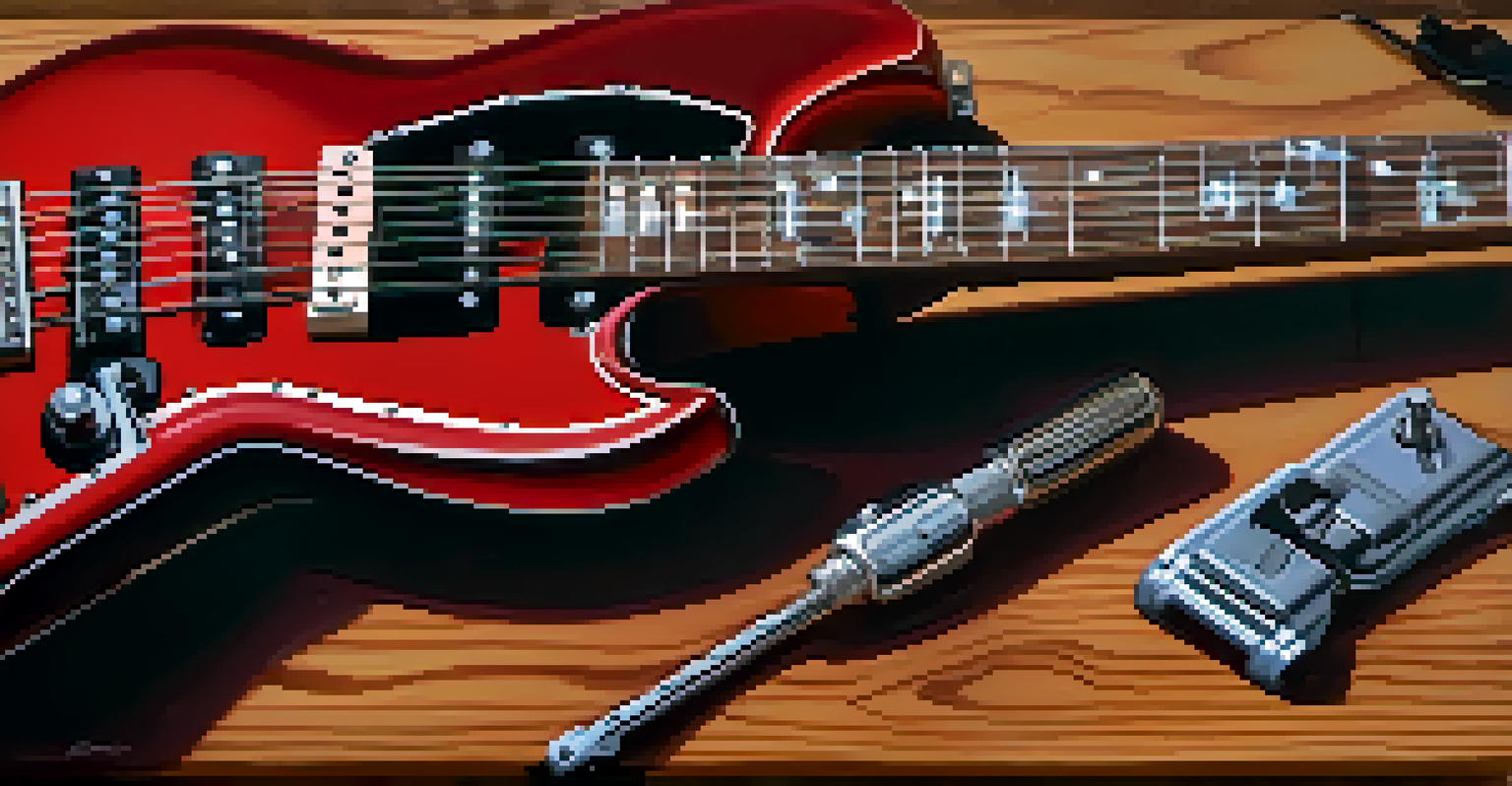How to Pick the Perfect Guitar for Your Unique Playing Style

Understanding Your Playing Style and Preferences
Before diving into the world of guitars, it's crucial to recognize your playing style. Are you strumming chords for folk songs, shredding solos in rock, or picking delicately for classical pieces? Each style demands different guitar features, so take a moment to reflect on what excites you musically.
The guitar is a miniature orchestra in itself.
Consider the genres you love most and how they influence your choice. For instance, if you're drawn to blues, you might lean towards a hollow-body electric guitar for its warm, resonant tones. On the other hand, if you enjoy upbeat pop, a bright-sounding acoustic might be right up your alley.
Understanding your preferences will streamline the selection process and lead you to a guitar that feels like an extension of yourself. Remember, the right instrument can inspire you to play more often and improve your skills.
Acoustic vs. Electric: Which One Speaks to You?
When it comes to guitars, the first major decision is often between acoustic and electric. Acoustic guitars are great for their simplicity and portability, making them perfect for campfire sing-alongs or intimate gigs. If you enjoy the richness of sound without the need for amplification, an acoustic may be your best bet.

On the flip side, electric guitars offer a wide range of tones and effects, allowing for more versatility in various music genres. If you’re aiming for powerful riffs and intricate solos, an electric guitar can provide that edge with its ability to manipulate sound through amplifiers.
Identify Your Playing Style
Recognizing your musical preferences helps you choose a guitar that complements your style and inspires you to play more.
Ultimately, the choice between acoustic and electric should reflect your musical ambitions. Test both types to see which resonates with you, as the right choice can significantly enhance your playing experience.
Choosing the Right Guitar Body Type
Guitar body types can significantly affect both sound and comfort. For acoustic players, options range from dreadnoughts to parlor guitars, each offering unique tonal qualities. For example, a dreadnought produces a strong bass response, ideal for rhythm playing, while a parlor guitar is more compact and great for fingerstyle.
Music is the shorthand of emotion.
Electric guitars also come in various body shapes, from solid to semi-hollow designs. A solid body, like a Fender Stratocaster, is perfect for rock and pop due to its sustain and feedback control, while a semi-hollow body, such as a Gibson ES-335, gives a warmer tone suitable for jazz and blues.
The right body type should feel comfortable in your hands while also complementing your desired sound. Trying out different shapes can help you find the perfect fit, both physically and sonically.
Neck Profile and Playability: What to Look For
The neck profile of a guitar plays a pivotal role in its playability. A slim neck may suit players with smaller hands or those who prefer fast playing, while a thicker neck can provide stability for heavier strumming and fingerstyle techniques. Understanding how neck width and shape affect your grip is essential.
Additionally, the scale length, which is the distance between the nut and the bridge, can influence string tension and note spacing. Shorter scales might make it easier to fret notes, especially for beginners, while longer scales can enhance tonal clarity, appealing to more advanced players.
Test Before You Buy
Hands-on experience with different guitars allows you to find the perfect fit in terms of comfort and sound.
When testing guitars, pay attention to how the neck feels in your hands. The right neck profile can make all the difference in your comfort and overall playing experience.
String Gauge: Finding Your Perfect Fit
String gauge refers to the thickness of the guitar strings, which can greatly influence playability and tone. Lighter gauge strings are easier to bend and press down, making them ideal for beginners or those who favor intricate fingerwork. They can also offer brighter tones, which some players prefer.
Heavier gauge strings provide a fuller sound and greater volume, which can be advantageous for strumming and rhythm-based playing. However, they require more finger strength and can be harder on the fingertips, especially for new players.
Experimenting with different string gauges enables you to discover what feels best for your style and playing technique. A small change in string gauge can sometimes lead to a significant improvement in your overall sound.
Budgeting: Finding Quality Within Your Price Range
Setting a budget is crucial when searching for the perfect guitar. Quality instruments can be found at various price points, so it's essential to determine how much you're willing to invest. Keep in mind that a higher price tag doesn't always guarantee a better sound or playability.
There are many great entry-level guitars that can serve you well as you develop your skills. Brands like Yamaha and Fender offer affordable options that don’t compromise on quality. As you progress, you can always upgrade to a more advanced model that suits your evolving style.
Maintain Your Guitar Properly
Regular maintenance ensures your guitar remains in great condition, enhancing its sound and longevity.
Being mindful of your budget allows you to explore various options without feeling overwhelmed. Plus, there’s nothing quite like the thrill of finding a fantastic guitar that fits your financial plan.
Test Driving: The Importance of Hands-On Experience
Once you've narrowed down your options, the best way to find your perfect guitar is to test drive them in person. Visit local music stores where you can hold, strum, and play different models. This hands-on experience is invaluable, as it allows you to connect with the instrument before making a commitment.
Pay attention to how each guitar feels while playing. Does it feel comfortable? Do you enjoy the sound it produces? Remember, what looks good on paper may not always translate to a great playing experience.

Don't hesitate to ask for help from knowledgeable staff in the store. They can provide insights and recommendations based on your playing style, ultimately guiding you toward a guitar that feels just right.
Maintaining Your Guitar: Care Tips for Longevity
Once you've found your ideal guitar, it's essential to maintain it properly to ensure its longevity and performance. Regular cleaning, restringing, and proper storage can make a significant difference in how your instrument sounds and feels over time. Simple upkeep can prevent costly repairs down the line.
Humidity and temperature can affect your guitar's wood, so storing it in a stable environment is crucial. Consider investing in a good case to protect it from the elements and accidental damage, especially if you plan to take it on the road.
Adopting a maintenance routine can enhance your relationship with your guitar, keeping it in top shape for years to come. After all, a well-cared-for instrument can inspire you to play more often and create beautiful music.